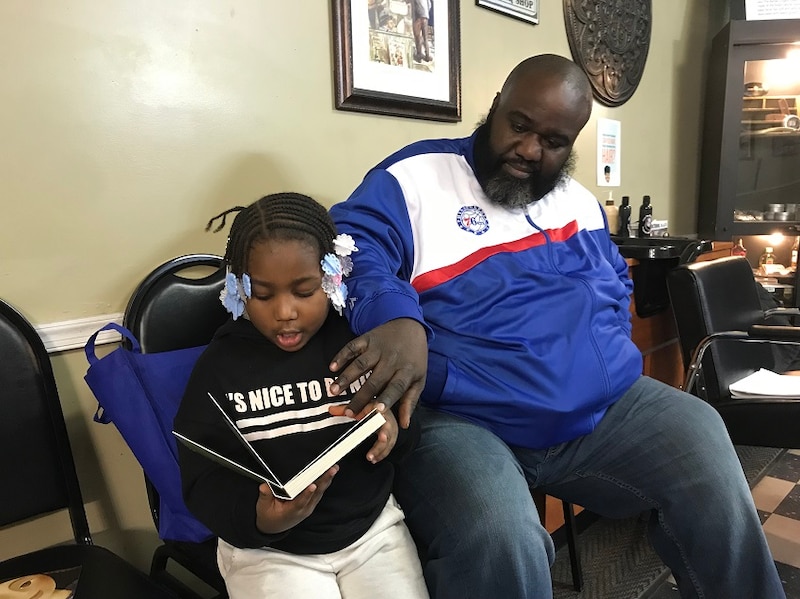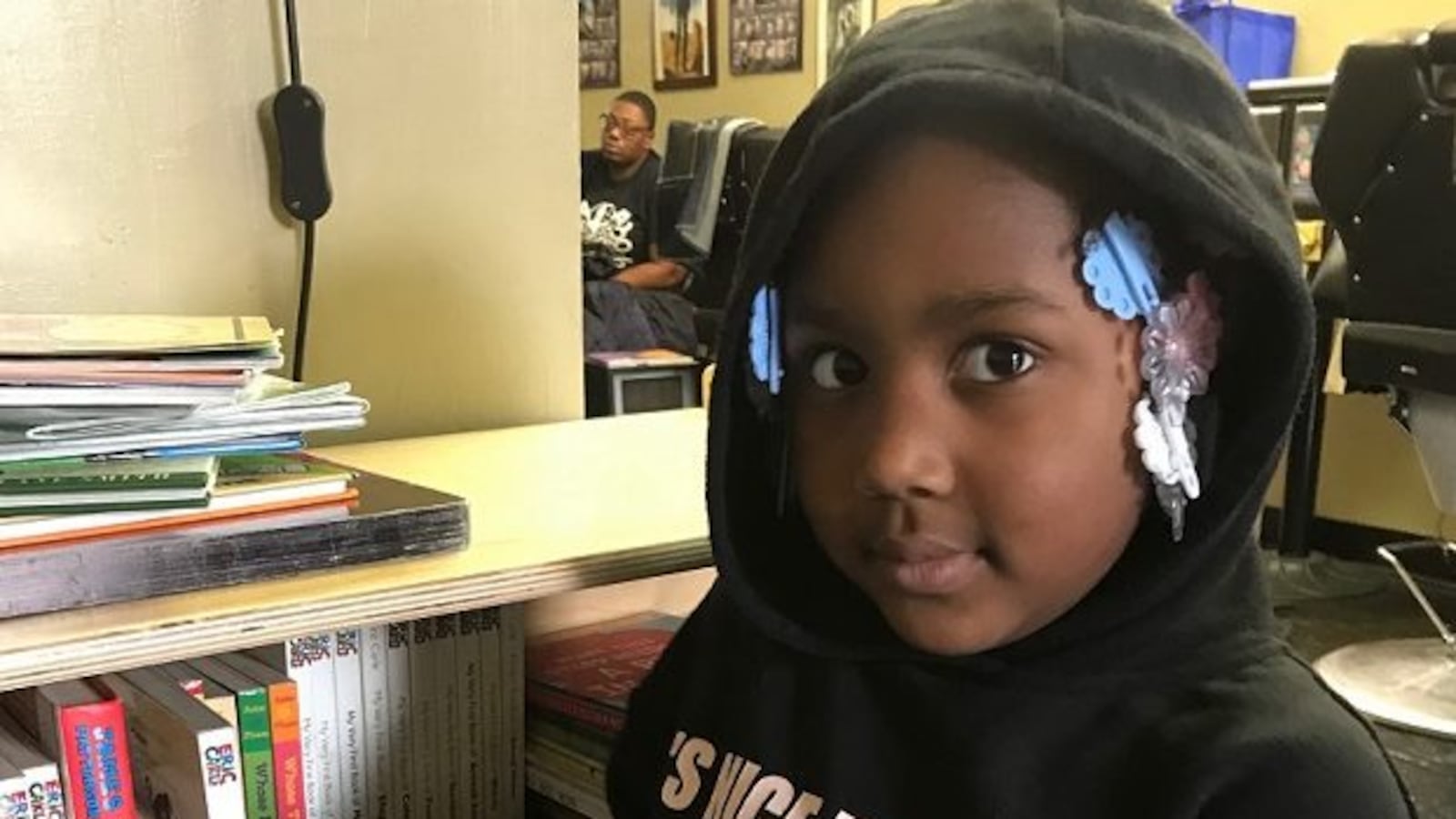This article was originally published in The Notebook. In August 2020, The Notebook became Chalkbeat Philadelphia.
Jasmond “Jazz the Barber” Schoolfield has been around too long and seen too much to have illusions about the challenges life poses in the North Philadelphia neighborhood where he earns his living cutting hair.
“We’re witness to a lot of stuff – drugs, crime,” said Schoolfield, 42.
But there is an alternative universe, one where an alligator worries about turning pink after swallowing a watermelon seed and where green eggs go best with ham, no matter what Sam thinks.
It’s that world that youngsters visit when they stop by Schoolfield’s shop, Creative Image Unisex Hair Salon on the corner of 28th Street and Cecil B. Moore Avenue. In North Philadelphia, Jazz is a “Reading Captain,” one of many programs partnered with Read by 4th, a nationally acclaimed citywide campaign to attack poverty by boosting early childhood literacy.
At Jazz’s place, the children and their grownups can pluck kids’ books like the “Watermelon Seed” and “Green Eggs and Ham,” from well-stocked book nooks to read there or take home.
“Statistically speaking, scientists and psychologists study this, so they know, if you don’t have an education, you can’t get a job, and you are going to have to resort to doing things on the corner like selling drugs or other things that are inappropriate,” Jazz said during one afternoon at his shop. “You could wind up in jail. So reading is important.”
That’s it in a nutshell, or maybe, in a watermelon seed.
The idea behind Read by 4th is simple, which is why it has been so widely embraced in Philadelphia. The city is considered a leader in the grade level movement, which has programs in 360 U.S. communities.
Read by 4th is based on the theory that children learn to read in kindergarten through third grade. After that, from fourth grade to Ph.D., they read to learn in all subjects, from science to social studies. Research shows, educators say, that a child who cannot read on grade level by the end of third grade is at increased risk of falling behind in school and dropping out. The consequences spiral down from there–poorer job prospects and economic struggles, sometimes for generations.
“We’ve got to take on generational poverty,” said Ralph Smith, a former University of Pennsylvania law professor who, as managing director of Washington, D.C.-based Campaign for Grade-Level Reading, is considered the founder of the national movement. “That’s the moral imperative of our time.”
Reading on grade level, he said, is a pivot point.
Smith served in Philadelphia School District leadership under Superintendent Constance Clayton from 1983 to 1990 and under Superintendent David Hornbeck from 1994 to 1996.

Reading Hero Jasmond “Jazz the Barber” Schoolfield reads to his 5-year-old granddaughter, Harmonee Schoolfield. Photo by Jane M. Von Bergen.
Read by 4th’s annual Mayoral Summit for its partners, on March 5, honors particularly its “Reading Captains” like Schoolfield who distribute books and promote early literacy resources in neighborhoods.
Its Reading Captains are part of what makes the Philadelphia campaign nationally known, said Michael English, executive director of Turn the Page, a similar program in Kansas City, Mo. The Philadelphia campaign, he said, “has a great reputation for a very well-thought out strategic campaign, but also as an innovator. At the same time, they have, more so than any other community, really pressed the academic community” to make sure new teachers are learning the best reading science.
Read by 4th has pushed hard to involve St. Joseph’s, Temple and Drexel universities in promoting “Knowledge and Practice Standards of Teaching Reading” as an integral part of teacher education.
Judging by test scores, Read by 4th’s efforts are beginning to pay off. The campaign launched in July 2015. Initial test results from the spring 2016 PSSA tests showed that 70 percent of the city’s third-graders were reading below grade-level with 30 percent reading at or above grade level.
By the spring of 2018, PSSA scores improved–third-graders reading at or above grade level improved to 35 percent and those below grade level fell from 70 percent to 65 percent.
“It’s a marathon, not a sprint,” said Diane Castelbuono, the District’s deputy chief for early literacy. “We didn’t get into this problem overnight. But we have steady progress that is sustainable. We’re building capacity in our schools, in our communities and our neighborhoods.”
In Philadelphia, the Read by 4th campaign was spearheaded by Donna Cooper, the executive director for the advocacy organization Public Citizens for Children and Youth, and Sharmain Matlock-Turner, president and chief executive of the Urban Affairs Coalition.
Together, funded by an innovation grant from the Barra Foundation, they assembled 110 partners–the School District, nonprofits, the Free Library of Philadelphia, the city, advocates, the District Attorney’s office, the probation department and the health department. Now there are more than 130 partners who deal with all facets – some are involved with tutoring, some provide books, some design programs for parents, some sponsor workshops.
Cooper said that she and Matlock-Turner decided from the start that the partners weren’t going to sit around and commiserate. “We can’t walk out of here without a strategic plan and who is going to do what,” Cooper said. They insisted on signed contracts, and committing dollars and manpower.
Then, “we needed someone to run it,” Cooper said. The Free Library of Philadelphia was the best choice, she said, because the Library’s mission was clearly aligned and lacked the political baggage attached to the city or School District.
Jenny Bogoni, a no-nonsense nonprofit veteran, was hired to be the executive director. “I honestly, in my core, feel we have the right ingredients to crack this problem,” she said.
The ingredients are:
• Improving and expanding quality pre-K, now underway.
• Improving attendance with a marketing campaign and attendance ambassadors in schools.
• Reading Captains and Reading Heroes to bring more books to the community.
• Building home libraries. Nearly 1.1 million books have been distributed and 785 book installations have been created.
• Training for parents at 590 workshops so they can learn techniques for reading to their children and for building reading into everyday experiences such as food shopping. An app with tips now has more than 1,500 subscribers.
• Training for teachers. In the first three summers, 2,000 teachers were trained in the latest science for teaching reading. Schools have reading coaches to help teachers put into practice what they’ve learned. Funding for the $7.5 million effort came from the William Penn and Lenfest foundations and others.
The School District, Castelbuono said, didn’t experience the resentment that sometimes ensues when outsiders parachute in with their ideas, however well-intentioned. From the start, she said, the Read by 4th partners focused on helping each other, without blaming each other.
“It was a large-scale movement where everyone started to see their piece of the puzzle,” said Castelbuono. “It wasn’t like this is just a school problem, or just a parent problem, or just a community problem. We’re all in this together and we all have a role to play.”

